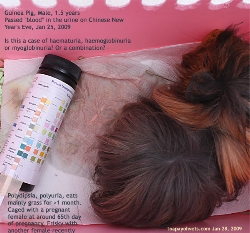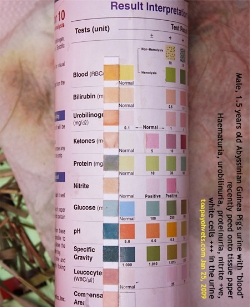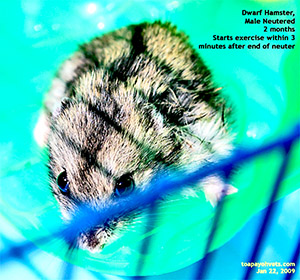Wed 28 Jan 2009
3rd day of Chinese New Year
OPENING ON 3RD DAY OF CHINESE NEW YEAR
Most of the tenants of the Toa Payoh industrial park in my area are still closed for business. Traditionally, they open a while in the morning and close. I note that some eating houses operated by Chinese owners were open on Chinese New Year's Day too. I am open as normal but my associate veterinarian does not open this evening. I opened in the morning of Chinese New Year and the 2nd day to attend to emergencies.
FOLLOW UP:
GUINEA PIG PASSING BLOOD ON CHINESE NEW YEAR'S DAY
"What's happened to the guinea pig that passed blood in the urine on Chinese New Year, 26 Jan 2009 and treated by me? It is now 2 days. Yesterday, the young lady who had reported yesterday that she did not see any blood and had inadvertently given more antibiotic syrup from the syringe. She said, "He eats more now."
I phoned her at 10 am today to follow up as to whether the guinea pig still urinates "blood". .
"He pees normally," she said.
"No more blood in the urine?"
"No," she said. "I put a white piece of cloth in his cage and will be able to see if the urine is red." That was an excellent idea. The news were good so far.
"Did you measure how much he drinks per day?" I had advised monitoring the water intake of all 4 guinea pigs.
"I restricted his water. He used to drink 300 ml a day compared to the other 3 that drink 130 ml per day. Now he drinks 250 ml and eats more pellets (1-2 teaspoonful) than before treatment."
ISOLATION, REST, FEEDING AND MEDICATION
Previously he was housed together with his mate who is now pregnant but has not given birth. "He is kept in my bedroom," the young lady said. "He squeals and wants to go out to meet the other 3 guinea pigs."
"It is best not to let him mix with them for the next 7 days or more," I advised letting this sick guinea pig rest and recover.
Guinea pigs give birth from 65-72 days after mating but the owner did not know when she was mated.
 WHAT HAPPENED DURING CHINESE NEW YEAR?
WHAT HAPPENED DURING CHINESE NEW YEAR?The young lady noticed large amounts of blood or blood-stained urine in the evening. Phoned all emergency vets in Singapore and the Seller. I advised her to go to the bigger practice. "What can I do?" she phoned me again as veterinary fees will be considerable for after-office hours now. "Nothing much you can do," I said. "If you wish to, I can examine the guinea pig on Chinese New Year in the morning." I didn't expect her to come. But she came with her friend.
HISTORY
Abyssinian Guinea Pig (GP), Male, 1.5 years old, 900 grams.
2 months ago in November 2008, the pet shop stopped ordering the LM Animal Food (USA) as the company's dog food was withdrawn. This GP just would not eat the alternative dry food or other brands unlike the other 3 guinea pigs. He was plump on the LM Animal Food GP pellets unlike now. He even impregnanted the female who is now pregnant and housed with him in a "big" cage. He eats dried grass (hay) and alfalfa hay most of the time, about 90% of his diet. He showed some interest in mating with another female GP when all 4 GPs were put together during cleaning of the 2 cages.
Each cage has a pair of GPs. Around Chinese New Year's Eve on Jan 25, 2009, the owner noticed blood or blood-stained urine.
GENERAL EXAMINATION
Thin at 900 grams. No trauma to body or external genitalia. The GP was turned upside down and the penis protruded. Penile area not painful or red. No squealing objection from the GP.
DETAILED EXAMINATION
1. Abdominal palpation of kidneys and bladder.
GP squealed on abdominal palpation indicating discomfort and/or pain. Kidneys and bladder were not palpable. Was there some traumatic injury to the bladder and kidneys at some stage when the 4 GPs met a day earlier? Was there traumatic injury caused by the pregnant mate in the same cage? The lady owner did not think so. But don't rule out this possibility. There was abdominal pain.
2. Urine examination.
How to get urine from this GP?
Patience is the key.
I put him onto white tissue paper in his pink carrier bag. Sometimes, after abdominal palpation, urine is passed. After some 30 minutes, the GP peed. There was discoloured urine. A dipstick was put onto the urine and examined.
DIAGNOSIS
Is this a case of haematuria, haemoglobinuria, myoglobinuria or a combination?
Significant findings of the dipstick were possible haematuria, urobilinuria, proteinuria and the presence of white cells in the freshly passed urine. There was urinary tract infection.
Was it pyelonephritis, glomerulonephritis, nephrosis or cystitis as the Guinea Pig had polydipsia and polyuria for around 4 weeks indicating a kidney malfunction? So what's the diagnosis?
Was haemoglobinuria or discoloured urine due to the eating of lots of hay and alfalfa every day be possible. Yes. I said to the doubtful lady owner, "A person taking too much Vitamin C could have kidney problems as the Vitamin C accumulates in the kidney." The lady owner assumed that Guinea Pigs eats grasses. Why should he have discoloured urine just by eating grasses and grasses all day long?
Was there infection of the bladder and kidneys? Yes. Most likely the bladder but more tests needed to be done and this might be costly. Possibly there was a kidney or liver malfunction too as there was polydipsia and polyuria for at least one month.
I would go for the combination, but haematuria could not be ruled out.
 A urine analysis by the laboratory would be best but it
would cost more money for the owner. Antibioitic SC was given.
Isolation, rehydration and oral antibiotics for 7 days
recommended. Reduce hay eating by 50% and give more pellets.
A urine analysis by the laboratory would be best but it
would cost more money for the owner. Antibioitic SC was given.
Isolation, rehydration and oral antibiotics for 7 days
recommended. Reduce hay eating by 50% and give more pellets.
2 DAYS LATER.
The news was good. No more worries about "blood" in the urine. This may not be a simple case of haematuria. Traumatic injury to the kidneys could not be ruled out as this Guinea Pig did attempt to mate with the other female or play with the other 3 pets during assembly time when the two cages were cleaned before Chinese New Year. There was abdominal pain on palpation as evidenced by the Guinea Pig squealing as if in pain when I felt the whole abdomen during examination. As far as the owner is concerned, the Guinea Pig is fine and eating and that is what matters. I guess the bottom line is that the veterinarian must resolve the problem of the owner. A perfect and correct diagnosis may not be so important to the owner as the resolution of lher pet's problem in private practice.
ADVICE
If your GP drinks excessively, pees excessively, it is best to consult your vet early and promptly as such behaviour is not medically normal
 TOA
PAYOH VETS
TOA
PAYOH VETS